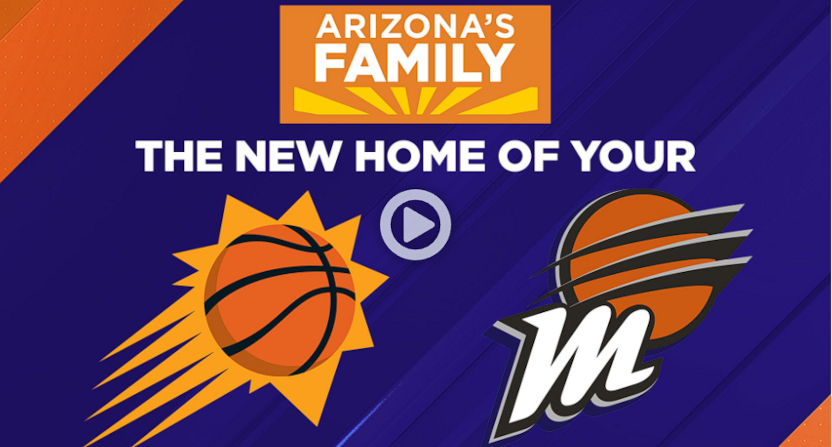One of the big debates around the current Diamond Sports bankruptcy proceedings and the Warner Bros. Discovery decision to get out of the regional sports network business is the future of RSNs as a whole. With the WBD ones, there’s been talk of those RSNs perhaps continuing as is but just transferring to teams. And with the Diamond ones, there’s been discussion of those perhaps continuing under the new ownership of debtholders post-bankruptcy restructuring (although the various non-payments and partial payments to some teams raise questions about what rights they’ll still have).
But there have also been conversations about moving away from the RSN model entirely. Those have been especially prominent with Major League Baseball talking about taking over affected clubs’ game broadcasts themselves. But the first teams to actually do so are…the NBA’s Phoenix Suns and the WNBA’s Phoenix Mercury?
The Suns and Mercury had their games broadcast on Diamond Sports’ Bally Sports Arizona and streamed on Bally Sports+. But that’s now coming to an end in favor of broadcast TV and a different direct-to-consumer streaming option with Kiswe. Here’s more on that from a post from the website of the two Phoenix-based stations involved, independent Phoenix station KTVK (3TV) and also Phoenix-based KPHE, acquired by Gray last year and recently relaunched as the Arizona’s Family Sports and Entertainment Network (“Arizona’s Family” is the branding used for Gray’s three Phoenix stations, also including CBS affiliate KPHO):
Today, Arizona’s Family, in partnership with the Phoenix Suns and Phoenix Mercury, announced a transformative media rights deal to bring every locally broadcast game to viewers for free in a statewide distribution model utilizing Arizona’s Family television stations KTVK (3TV) and the newly launched KPHE (Arizona’s Family Sports & Entertainment Network).
Upon the expansion of KPHE into the Tucson and Yuma markets in the next several weeks, the new media rights deal will make the Suns and Mercury games available to nearly 2.8 million households across all three of Arizona’s three media markets, tripling the teams’ reach to fans who have been unable to access the games through its previous distribution arrangement with a non-broadcast regional sports network.
“Live sports can bring a community together. Combining that with the power of broadcast television and Arizona’s Family, it becomes a multiplier effect benefitting the team, the fans, and the clients,” said Debbie Bush, Vice President and General Manager, Arizona’s Family. “Our goal since day one has been creating a model that provides all fans the ability to connect with and cheer on their favorite teams via the distribution method of their choice. We are confident this model will increase fan loyalty and engagement.”
Fans will also be able to watch games through a DTC (Direct-To-Consumer) streaming option alongside the over-the-air broadcast product powered by Kiswe. Subscribers will be able to access the DTC streaming through a Suns or Mercury branded app on their smartphones or Smart TVs. The 2023 Phoenix Mercury season will stream DTC for free.
“We are excited to be partnering with the Phoenix Suns, Phoenix Mercury, and Gray Television on this groundbreaking new direct-to-fan distribution model,” said Glenn Booth, CEO of Kiswe. “Kiswe’s goal is to bring live sports to all fans through immersive digital experiences, and we can’t wait to start streaming games to any Arizona basketball fans who want to watch these iconic teams.”
It’s fascinating to see teams go to a full-broadcast model. We’ve written many times about the growing divide between broadcast and cable with increased cord-cutting and how much of an effect that’s having in sports, and that’s even more notable with less-distributed RSNs than with national cable networks like ESPN or FS1 (which themselves aren’t reaching almost 50 million of the 123.8 million U.S. TV homes). So there’s certainly more access for viewers with broadcast TV, which can be picked up either through a multichannel video provider or through an antenna. And pairing this with direct-to-consumer streaming also seems solid, and starting that with free Mercury games is a good way to test the waters there.
A big question here is how much these broadcast networks and Kiswe are paying the Suns and Mercury, and if that can come close to replacing the revenue they were getting from Bally Sports Arizona. There’s always been increased access on broadcast TV, and many teams in many sports used to have significant numbers of games there. But the RSN model (which started with MSG in a limited fashion in 1969, grew over the next decades, and really took off in the 1990s and early 2000s) has seen such wide adoption largely because of the ability to get massive per-subscriber fees for those networks (regardless of if those subscribers actually watched), allowing them to pay teams more than broadcast networks had.
As MLB commissioner Rob Manfred said recently, “It’s a great business model when a whole bunch of people pay for something they don’t really care if they have or not, which is what the cable bundle did for us. It’s hard to replicate that.” The Suns and Mercury are now making the first move away from that model. And it will be interesting to see how that goes and if others follow. This will start with a KTVK/KPHE/Kiswe broadcast of the Mercury (featuring Brittney Griner) against the Minnesota Lynx on May 25.
Update: However, John Ourand of Sports Business Journal writes that Diamond is saying they have an option to match, and is threatening to sue:
Ourand also noted that Rebecca O’Sullivan-Schulte, the GM of Bally Sports West, Bally Sports SoCal, Bally Sports San Diego and Bally Sports Arizona, announced her resignation this week for personal reasons. She’ll work through May 26, though, and Ourand said he’s been told “her decision had nothing to do with this Suns situation.” But it’s going to be interesting to watch how this pushback from Diamond plays out, and if the broadcast deal here actually comes into effect or not.
